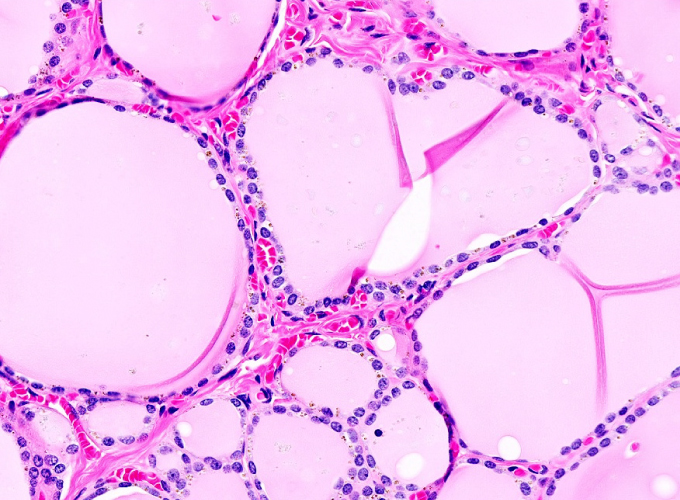A 13-year-old boy is brought to the clinic due to progressive difficulty with breathing, hoarseness, and dysphagia. The symptoms began insidiously 6 months ago but have rapidly become worse in the last 4 weeks. The patient has no associated skin rash, pharyngeal pain, fever, weight loss, or loss of appetite. Medical history is unremarkable and the patient takes no medications. He is up to date on scheduled vaccinations. The patient's parents and siblings have no history of significant health problems. Vital signs are normal, and he is at 70th percentile for height and weight. Oropharyngeal examination reveals a large, red lingual mass. The patient subsequently undergoes excision of the mass; histopathologic preparation of the recovered tissue is shown in the image below.  Failure of which of the following embryologic processes is most likely responsible for this patient's lesion?
Failure of which of the following embryologic processes is most likely responsible for this patient's lesion?
Definitions:
Bed Sores
Pressure ulcers that develop on the skin from prolonged pressure, often affecting individuals who are bedridden or immobile.
Physical Neglect
Failing to provide adequate physical care, such as food, shelter, health care, and safety, to a dependent individual.
Elder Maltreatment
Abuse or neglect of older adults, involving physical, emotional, sexual, or financial harm, or neglect.
Adults
Individuals who have reached full physical maturity, typically characterized by completed growth and the attainment of legal age for societal responsibilities and privileges.
Q14: A 59-year-old man comes to the office
Q25: A 48-year-old woman comes to the emergency
Q37: A pharmaceutical researcher develops a new drug
Q60: A 79-year-old woman is brought to the
Q67: A 56-year-old man comes to the office
Q72: Plasma homocysteine levels are measured in patients
Q86: A 28-year-old man comes to the office
Q92: Molecular biologists undertake a series of experiments
Q114: A 70-year-old man is hospitalized due to
Q215: A previously healthy 27-year-old man comes to